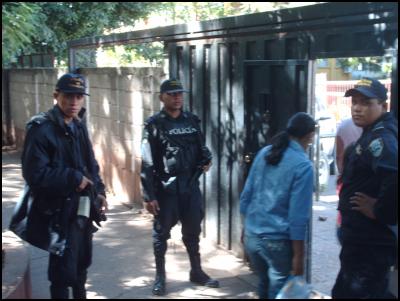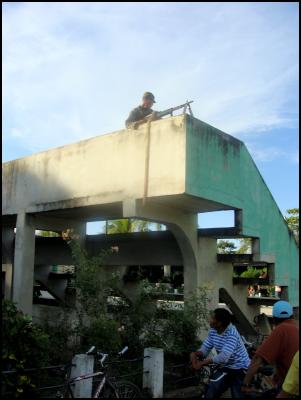Honduran Elections: What's in a majority
Honduran Elections: What's in a majority
by Julie Webb-Pullman
Itś official - Pepe Lobo of the National Party won 56% of the vote. The fact that this represents 56% of the lowest turnout ever, is a fact being glossed over by the majoprity of the international corporate media, in their indecent haste to present this presidency as somehow valid.
At the press conference to announce the electoral results, the Supreme Electoral Tribunal announced the final count of 1.7 million votes cast, out of 5.07 million registered voters.
Never one to let the facts get in the way of the right-wing agenda, CNN (Credible Numbers - Never) reported a turnout of 70%, while other mainstream media ranged from 50 - 65%. My calculator says 1.7 as a percentage of 5 is 34%.
Lobo thus has the support of only 19% of Honduran voters at best
Even the most mathematically-challenged of them will have a hard job explaining how a president without the support of 81% of the population could possibly be considered to have the mandate of the people.
Barack Obama and the U.S. State Department are also obviously in need of remedial math - democracy is when the majority prevail. 81% against Lobo is a pretty indisputable indication that this man is NOT a democratically representative president-elect.
And that is if the election could even be considered legitimate, which it clearly cannot.
The Honduran elections were held by an illegitimate government, who seized power in a military coup. The results of such elections can therefore be nothing other than illegitimate. This fundamental fact is undeniable, and unavoidable - and the reason why the United Nations, numerous international governments, and scores of credible NGOs refused to send election observers, or in any way recognise either the farcical electoral process or its results.
It is no surprise that those who rushed to recognise it - the United States, Israel, Colombia, Panama, and Costa Rica - are most notable for their own repressive and often coup-stained histories, littered with similarly corrupt and illegitimate electoral processes.
To anyone present in Honduras during the electoral farce, descriptions such as "clean", "peaceful" or "uneventful", "free" and "fair", have a very hollow ring.
With at least two citizens in a critical condition, several disappeared, and numerous beatings, and rapes, "clean" is hardly the word to describe the blood spilled in the days leading up to, of, and since the election.
Armed raids, gas and bullet attacks against the citizenry do not count as "peaceful" or "uneventful" to the thousands subjected to them.
"Free" and "fair" are the last words to describe an election held in an atmosphere of terror, where the only occasions in which there was silence in the streets was not due to peace, but to abject fear of leaving the house, especially to walk along streets to vote in polling booths, such as those pictured, merely a few such examples taken on election day.
This is what the United States, Israel, Colombia - three of the most militarised states in the world - consider to be a paradigm of the democratic process, and an acceptable outcome for Hondurans.
81% of Hondurans do not agree, and nor should any country with even the remotest commitment to the rule of law.
The Honduran elections were conducted by an illegal regime, under conditions of severe repression. To recognise them is to validate the continued repression of the Honduran people, and to ignore the principles of democracy, international law, and justice.
The Honduran Resistance, most Latin American governments, and hundreds of international organisations including Amnesty International, are calling on the world to act with integrity, and refuse to recognise the illegitmate government of illegitimate president-elect Pedro Lobo.
The future of a truly democratic Honduras depends on it.

Click for big version
Polling booth (photographer unknown)

Click for big
version
Polling booth at a school in Jutiapa (Tyler
Shipley)
Julie Webb-Pullman (click to view previous articles) is a New Zealand based freelance writer who has reported about - and on occasion from - Central America for Scoop since 2003. Send Feedback to julie@scoop.co.nz


 Ian Powell: The Dirtiest Of Politics And A Tale Of Two MPs Cloaked In Hypocrisy
Ian Powell: The Dirtiest Of Politics And A Tale Of Two MPs Cloaked In Hypocrisy Gordon Campbell: On A Neglected, Enduring Aspect Of The Francis Era
Gordon Campbell: On A Neglected, Enduring Aspect Of The Francis Era Eugene Doyle: 50 Years After The “Fall” Of Saigon - From Triumph To Trump
Eugene Doyle: 50 Years After The “Fall” Of Saigon - From Triumph To Trump Lynley Tulloch: Pulling The Mat Out From Under The Early Childhood Education (ECE) Sector
Lynley Tulloch: Pulling The Mat Out From Under The Early Childhood Education (ECE) Sector Howard Davis: NZSQ Inaugurates Wellington Chamber Music’s New Season
Howard Davis: NZSQ Inaugurates Wellington Chamber Music’s New Season Gordon Campbell: On The Trump Upside, And Peters Persecution Of Trans People
Gordon Campbell: On The Trump Upside, And Peters Persecution Of Trans People